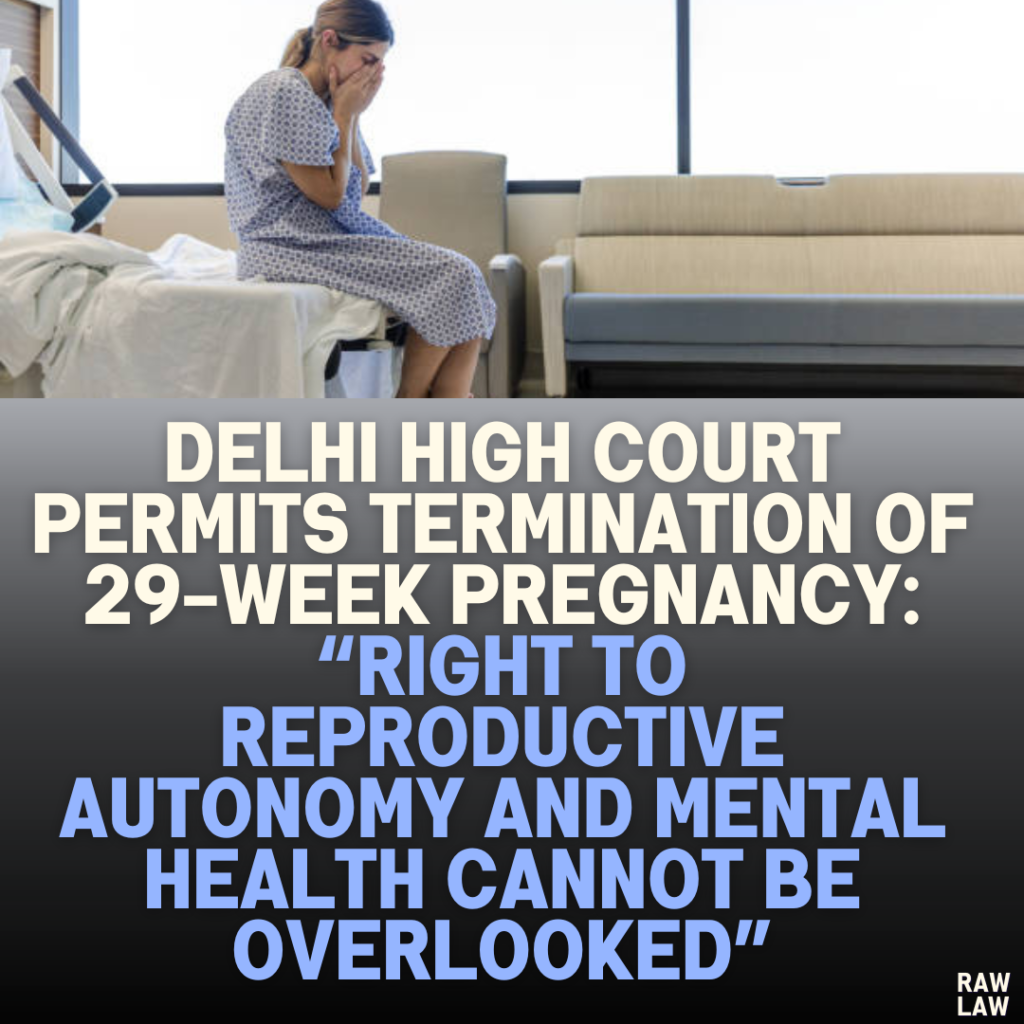Court’s Decision
The Delhi High Court allowed the petitioner to terminate her 29-week pregnancy, citing severe mental trauma caused by her husband’s recent death and the principle of reproductive autonomy. The court held that the petitioner’s deteriorating mental health, diagnosed with depression and suicidal tendencies, justified medical termination even beyond the statutory 24-week limit. It emphasized the necessity of prioritizing her mental and physical well-being, directing AIIMS to conduct the procedure.
The court clarified that this decision was based on the unique facts and circumstances of the case and should not be treated as a precedent.
Facts
- The petitioner got married in February 2023. Tragically, her husband passed away in October 2023.
- After returning to her parents’ home, she discovered she was 20 weeks pregnant during a medical check-up in late October 2023.
- In December 2023, she decided not to continue the pregnancy, citing emotional and financial hardships. However, doctors refused termination as her pregnancy had exceeded 24 weeks, which is the statutory limit under the Medical Termination of Pregnancy (MTP) Act, 1971.
- The petitioner approached the Delhi High Court seeking permission for medical termination, arguing that her mental health had worsened due to the pregnancy and the trauma of widowhood.
Issues
- Whether the petitioner could be allowed to terminate her pregnancy despite the statutory 24-week limit under the MTP Act?
- Whether the petitioner’s mental health concerns warranted an exception under the provisions of the MTP Act?
Petitioner’s Arguments
- The petitioner contended that her emotional trauma and recent widowhood caused severe mental health issues, making it impossible for her to carry the pregnancy to term.
- Citing the principle of reproductive autonomy, she argued that the decision to terminate the pregnancy should be hers, particularly when her health was at risk.
Respondent’s Arguments
- The respondents submitted that Rule 3B(c) of the MTP Rules, 2003 allows termination for women facing a “change in marital status,” such as widowhood, but only if the gestational age is within 24 weeks.
- They emphasized that the petitioner had crossed the permissible threshold for termination under the law.
Analysis of the Law
- Statutory Framework:
- The MTP Act, 1971, and its 2003 Rules permit termination of pregnancies up to 24 weeks under specific circumstances, including a “change in marital status” (widowhood or divorce) as per Rule 3B(c).
- Beyond 24 weeks, termination is only permitted if the fetus has severe abnormalities or if the pregnancy poses a threat to the mother’s life.
- Judicial Precedent:
- The court relied on the Supreme Court judgment in X vs. Principal Secretary, Health and Family Welfare Department, Govt. of NCT of Delhi (2022), which emphasized that a woman’s decision to terminate a pregnancy is protected by the right to reproductive autonomy and bodily integrity.
- The judgment also recognized that changes in material circumstances, such as widowhood, could significantly affect a woman’s ability to continue with a pregnancy.
- Mental Health Considerations:
- Psychiatric evaluations of the petitioner revealed severe depression and suicidal tendencies. Experts opined that her mental health would likely worsen if forced to carry the pregnancy to term.
- The court observed that mental health risks, as recognized under the MTP Act, extend to severe emotional trauma caused by life circumstances like bereavement.
Precedent Analysis
- The Supreme Court in X vs. Principal Secretary established that:
- Reproductive decisions are deeply personal and must respect a woman’s bodily autonomy.
- The impact of unforeseen changes in material circumstances, such as widowhood, must be considered in determining whether to allow termination of pregnancy.
- Applying this precedent, the Delhi High Court affirmed that reproductive autonomy encompasses the right not to procreate and that statutory limits should not override the petitioner’s mental health needs in exceptional circumstances.
Court’s Reasoning
- Reproductive Autonomy: The court emphasized that reproductive choices are intrinsic to bodily autonomy and decisional independence. It reiterated that societal or statutory constraints should not force a woman to continue with an unwanted pregnancy.
- Mental Health Impact: The psychiatric evaluation highlighted the petitioner’s suicidal tendencies and inability to cope with the pregnancy due to her husband’s death. The court found that these mental health risks justified intervention to avoid further harm.
- Unique Circumstances: The petitioner’s case involved extraordinary circumstances of bereavement and psychological distress, making it necessary to go beyond statutory limits to ensure her well-being.
Conclusion
The court permitted the petitioner to terminate her pregnancy at AIIMS, directing the hospital to proceed with the procedure immediately. It clarified that the decision was case-specific and should not set a precedent for general application.
Implications
- Strengthening Reproductive Rights: This judgment underscores the judiciary’s recognition of reproductive autonomy as a fundamental right, even beyond statutory limits.
- Mental Health as a Priority: It highlights the critical importance of mental health considerations in decisions regarding medical termination of pregnancy.
- Exceptional Relief: While the judgment is not meant to be a precedent, it signals that courts may grant relief in extraordinary circumstances, balancing statutory limitations with the principles of justice and autonomy.
